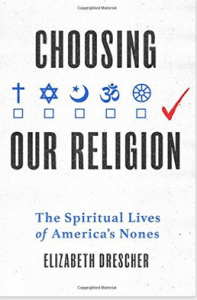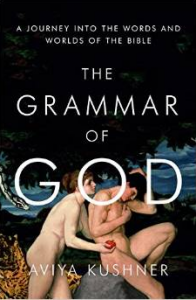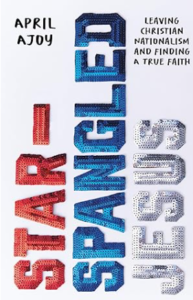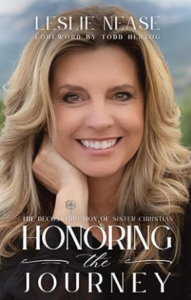 I received a complementary copy of this book for review purposes. The opinions are completely my own based on my experience.
I received a complementary copy of this book for review purposes. The opinions are completely my own based on my experience.
Look at the book cover to the left. When asked “what is your religion?”, and none of the choices presented seem to fit your own spiritual journey, are you tempted to check “none of the above?” If so then Elizabeth Drescher’s new book “Choosing Our Religion” may be for you.
Drescher describes those uncomfortable with identifying with any organized religion as “Nones”. The author spent two years interviewing Nones across the U.S. “This is not a book about Nones, but a book of Nones and their stories,” she writes in the book’s introduction.
And they are interesting stories, indeed. Such as this from a church going parent, “I’ve hidden my whole life as an unbeliever,” Jack wrote, “no one but my wife knew. Not our family or friends, not our children. That was the promise I made to her when we married. It didn’t seem such a big thing at the time. But it ate at me over the years.” And this from a woman who regularly attends church but doesn’t buy into the doctrine, “I’ve done it for almost twenty years – since I was in college, which means that I’ve been around church for long enough to know that most of it is a lot of crap. I don’t believe very much of it. But I like to sing, and I couldn’t do that if I told everyone I’m probably a None. A Lutheran None. So I keep quiet. I get to sing with people I really like every week, and I don’t have to deal with the rest of it.”
Choosing Our Religion is full of stories like this. I found these first hand accounts compelling – about a segment of society that is often misunderstood. A segment that Drescher thinks is frequently given harsh labels, like “individualistic”, “Narcissistic”, “uncommitted”, “unbelieving”, “consumerist”, “superficial”. “(they are considered) otherwise less serious and meaningful than those of people who anchor their spiritual identity to formal membership in institutional religions organizations,” the author feels.
I also got a sense from the book of how large a segment “the Nones”represent. “If the unaffiliated gathered into a formal religious organization, it would be larger than any Protestant denomination and all Mainline Protestant denominations combined,” Drescher writes.
A minor criticism of Choosing Our Religion: there are so many stories of Nones in the book, with a few quotes from each, that we really don’t get to know any of the subjects in depth. Perhaps fewer but longer stories would have made the book even better. Still I think Choosing Our Religion is a good read for those who don’t seem to fit into the religion of their family and friends. In reading of the challenges and successes of other Nones, maybe you’ll realize that your own spiritual practice isn’t so strange after all.



